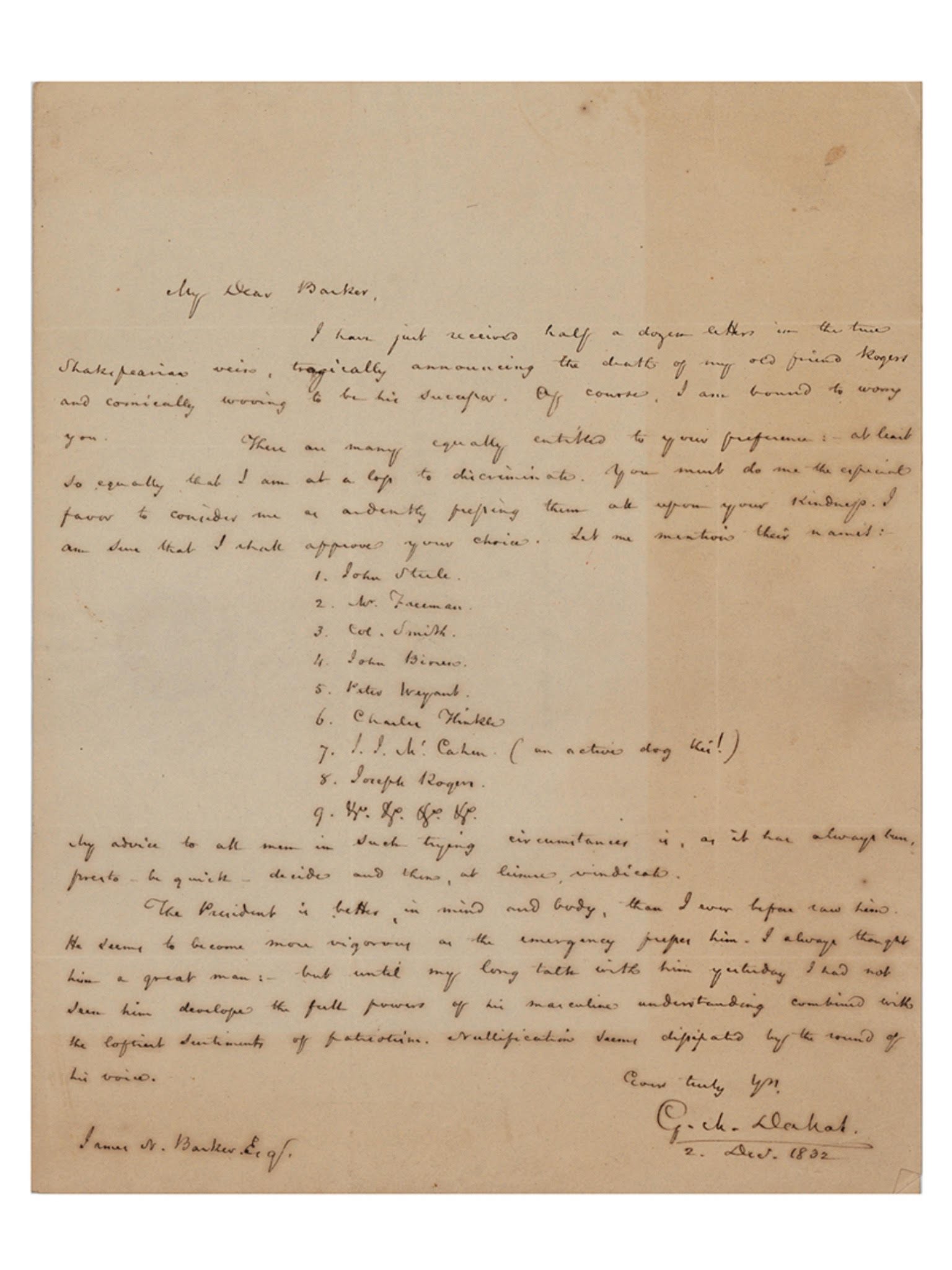 Image 1 of 2
Image 1 of 2

 Image 2 of 2
Image 2 of 2



George M. Dallas 1832 Autograph Letter Signed - And Free Frank
On President Jackson's "loftiest sentiments of patriotism" amidst the Nullification Crisis of 1832
Politician and diplomat (1792-1864) who served as Vice President under James K. Polk from 1845 to 1849; the city of Dallas, Texas, is said to be named for him.
Autograph letter signed “G. M. Dallas”. one page, 7.75 x 9.75, December 2, 1832. Handwritten letter to James N. Barker, collector at Philadelphia, in part:
I have just received a dozen letters in the Shakespearian vein, tragically announcing the death of my old friend Rogers and comically wooing to be his successor…There are many equally entitled to your preference:—at least so equally that I am at a loss to discriminate.
He goes on to provide a list of qualified men, concluding with commentary on Andrew Jackson:
The President is better, in mind and body, than I ever before saw him. He seems to become more vigorous as the emergency presses him. I always thought him a great man:—but until my long talk with him yesterday I had not seen him develop the full powers of his masculine understanding combined with the loftiest sentiments of patriotism. Nullification seems dissipated by the sound of his voice.
Addressed on the integral leaf by Dallas, and franked in the upper right, "G. M. Dallas, U. S. Senate."
In fine condition, with blocks of toning to right and bottom edges.
The 'Nullification Crisis' ensued when the state of South Carolina declared the federal Tariffs of 1828 and 1832 unconstitutional, and therefore null and void within the sovereign boundaries of the state. As President Jackson prepared to use military force against South Carolina to bring the state into compliance, a new tariff—the Compromise Tariff of 1833—was negotiated and agreed to by all parties.
On President Jackson's "loftiest sentiments of patriotism" amidst the Nullification Crisis of 1832
Politician and diplomat (1792-1864) who served as Vice President under James K. Polk from 1845 to 1849; the city of Dallas, Texas, is said to be named for him.
Autograph letter signed “G. M. Dallas”. one page, 7.75 x 9.75, December 2, 1832. Handwritten letter to James N. Barker, collector at Philadelphia, in part:
I have just received a dozen letters in the Shakespearian vein, tragically announcing the death of my old friend Rogers and comically wooing to be his successor…There are many equally entitled to your preference:—at least so equally that I am at a loss to discriminate.
He goes on to provide a list of qualified men, concluding with commentary on Andrew Jackson:
The President is better, in mind and body, than I ever before saw him. He seems to become more vigorous as the emergency presses him. I always thought him a great man:—but until my long talk with him yesterday I had not seen him develop the full powers of his masculine understanding combined with the loftiest sentiments of patriotism. Nullification seems dissipated by the sound of his voice.
Addressed on the integral leaf by Dallas, and franked in the upper right, "G. M. Dallas, U. S. Senate."
In fine condition, with blocks of toning to right and bottom edges.
The 'Nullification Crisis' ensued when the state of South Carolina declared the federal Tariffs of 1828 and 1832 unconstitutional, and therefore null and void within the sovereign boundaries of the state. As President Jackson prepared to use military force against South Carolina to bring the state into compliance, a new tariff—the Compromise Tariff of 1833—was negotiated and agreed to by all parties.
On President Jackson's "loftiest sentiments of patriotism" amidst the Nullification Crisis of 1832
Politician and diplomat (1792-1864) who served as Vice President under James K. Polk from 1845 to 1849; the city of Dallas, Texas, is said to be named for him.
Autograph letter signed “G. M. Dallas”. one page, 7.75 x 9.75, December 2, 1832. Handwritten letter to James N. Barker, collector at Philadelphia, in part:
I have just received a dozen letters in the Shakespearian vein, tragically announcing the death of my old friend Rogers and comically wooing to be his successor…There are many equally entitled to your preference:—at least so equally that I am at a loss to discriminate.
He goes on to provide a list of qualified men, concluding with commentary on Andrew Jackson:
The President is better, in mind and body, than I ever before saw him. He seems to become more vigorous as the emergency presses him. I always thought him a great man:—but until my long talk with him yesterday I had not seen him develop the full powers of his masculine understanding combined with the loftiest sentiments of patriotism. Nullification seems dissipated by the sound of his voice.
Addressed on the integral leaf by Dallas, and franked in the upper right, "G. M. Dallas, U. S. Senate."
In fine condition, with blocks of toning to right and bottom edges.
The 'Nullification Crisis' ensued when the state of South Carolina declared the federal Tariffs of 1828 and 1832 unconstitutional, and therefore null and void within the sovereign boundaries of the state. As President Jackson prepared to use military force against South Carolina to bring the state into compliance, a new tariff—the Compromise Tariff of 1833—was negotiated and agreed to by all parties.
